Best African Safaris & Travel Services – African Authentic Safaris Ltd
Kibale Forest & Crater Lakes Safari (3 Days/2 Nights)
from 0 review
3 days 2 nights
Daily Tour
Unlimited
___
Description
Immerse yourself in the enchanting biodiversity of Uganda’s primate capital with our Kibale Forest & Crater Lakes Safari. This meticulously crafted 3-day adventure takes you into the heart of Kibale National Park, home to the highest concentration of primates in Africa, including our closest relatives—chimpanzees. Experience the thrill of tracking chimps in their natural habitat, explore the mystical crater lakes region with its breathtaking volcanic landscapes, and discover the rich cultural heritage of the Batooro people. With expert guides, comfortable accommodations, and carefully planned activities, this safari offers a perfect blend of wildlife encounters, scenic beauty, and cultural immersion in one of Uganda’s most diverse ecosystems.
Highlights
- • Track and observe wild chimpanzees with experienced guides in Kibale Forest
- • Encounter up to 13 primate species including red colobus, L’Hoest’s, and mangabey monkeys
- • Explore the stunning crater lakes landscape formed by ancient volcanic activity
- • Experience a guided nature walk through the Bigodi Wetland Sanctuary
- • Spot some of the forest’s 375 bird species, including the rare Green-breasted Pitta
- • Enjoy breathtaking views across the crater lake region from scenic viewpoints
- • Learn about traditional medicinal plants and forest ecology from knowledgeable guides
- • Visit a local community for authentic cultural interactions and craft demonstrations
- • Stay in comfortable lodges with spectacular forest or crater lake views
- • Perfect combination of primate tracking, nature walks, and cultural experiences
Day 1: Kampala to Kibale Forest National Park
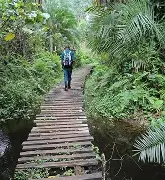
Your journey begins with an early morning pickup from your Kampala accommodation. Travel westward through Uganda’s scenic countryside, passing tea plantations, traditional homesteads, and the magnificent Rwenzori Mountains backdrop. After approximately 5 hours with comfort stops, arrive in Fort Portal for lunch. Continue to your accommodation near Kibale Forest National Park, checking in by mid-afternoon. Enjoy a guided walk around the picturesque crater lakes, learning about their volcanic formation and cultural significance. Your knowledgeable guide will explain local legends associated with these mystical waters. Return to your lodge for dinner and overnight stay, surrounded by the sounds of the forest.
Day 2: Chimpanzee Tracking and Bigodi Wetland Sanctuary
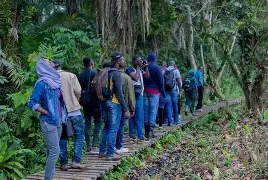
Rise early for breakfast before your highlight activity—chimpanzee tracking in Kibale Forest. After a briefing from park rangers, enter the lush forest in search of our closest relatives. Spend a captivating hour observing the chimps’ behavior, social interactions, and remarkable similarities to humans. Listen as your guide explains their complex communication and family structures. Return to your lodge for lunch and brief relaxation. In the afternoon, visit the community-run Bigodi Wetland Sanctuary, a biodiversity hotspot where you’ll spot numerous primates, birds, and butterflies while supporting local conservation efforts. Return to your lodge for dinner and evening relaxation.
Day 3: Cultural Experience and Return to Kampala

Begin your final day with breakfast before checking out. Embark on a cultural experience with the local Batooro community, learning traditional crafts, medicinal plant uses, and cultural practices that have sustained people in harmony with the forest for generations. Participate in basket weaving, traditional music, or food preparation depending on your interests. After a community-prepared lunch featuring local specialties, begin your return journey to Kampala. Travel through the beautiful countryside, reflecting on your experiences with primates and local communities. Arrive in Kampala by early evening with lasting memories and a deeper understanding of Uganda’s natural and cultural heritage.
- • Professional English-speaking safari guide/driver
- • Transportation in a 4x4 safari vehicle
- • Fuel for the entire journey
- • 2 nights’ accommodation near Kibale Forest
- • All meals as specified in the itinerary (breakfast, lunch, and dinner)
- • Bottled mineral water throughout the safari
- • One chimpanzee tracking permit per person
- • Guided crater lakes walk
- • Bigodi Wetland Sanctuary guided walk
- • Cultural community experience
- • All park entrance fees
- • Comprehensive pre-trip information
- • Government taxes and levies
- • International airfare
- • Visa fees ($50 for single entry)
- • Travel insurance
- • Alcoholic and soft drinks
- • Tips for guides and lodge staff (recommended: $10-15 per person per day)
- • Laundry services
- • Optional activities not mentioned in the itinerary
- • Additional chimpanzee tracking permits
- • Souvenirs and crafts
- • Personal expenses and toiletries
- • Any extensions to the safari
Tour's Location
What is the best time to visit Kibale Forest National Park?
Kibale Forest National Park can be visited year-round, but the optimal time for the Kibale Forest & Crater Lakes Safari is during the dry seasons from June to September and December to February. These periods offer more comfortable tracking conditions with firmer trails and less chance of rainfall interrupting activities. The forest remains lush and green even during dry months due to its equatorial location. The wet seasons (March-May and October-November) bring more challenging conditions but fewer visitors and potentially more fruit in the forest, which can make chimpanzees easier to find as they congregate around fruiting trees. Bird watching is exceptional year-round, with migratory species present from November to April enhancing the already impressive avian diversity.
How physically demanding is chimpanzee tracking in Kibale Forest?
Chimpanzee tracking in Kibale Forest ranges from moderately easy to challenging, depending on where the chimps are located on your tracking day. Typically, the experience involves 2-3 hours of walking through forest trails that can be uneven, slippery, and occasionally steep. Trackers locate the chimpanzees early each morning, allowing guides to lead visitors directly to their approximate location. Most tracking excursions find chimps within 30 minutes to 2 hours, though occasionally it may take longer. A reasonable level of fitness is recommended, as is wearing appropriate footwear with good traction. The forest can be humid, so participants should be prepared for some exertion. For those with mobility concerns, the park occasionally offers shorter, less strenuous tracking options if arranged well in advance.
What other primates might I see besides chimpanzees during this safari?
Kibale Forest National Park boasts the highest primate density in Africa with 13 species. Beyond the star attraction of chimpanzees, you’re likely to encounter several other fascinating primates during your safari. In the forest and Bigodi Wetland Sanctuary, common sightings include the black-and-white colobus monkeys swinging dramatically through the canopy, the endangered red colobus with their distinctive rusty-colored backs, grey-cheeked mangabeys with their distinctive white eyelids, and the playful L’Hoest’s monkeys with their characteristic white beards. You may also spot blue monkeys, red-tailed monkeys, and olive baboons. Nocturnal species like bush babies and pottos are harder to observe but occasionally seen during specialized night walks (available as an optional activity). The diverse primate population makes Kibale a true primate enthusiast’s paradise.
What should I pack for this safari?
For your Kibale Forest & Crater Lakes Safari, pack lightweight, breathable clothing in neutral or dark colors that can be layered. Long-sleeved shirts and long pants are essential for forest walks to protect against insects and scratches from vegetation. Include a light waterproof jacket as brief showers can occur even in dry seasons. Sturdy, closed hiking boots with good ankle support and traction are crucial for chimpanzee tracking on potentially muddy trails. Bring a small backpack for carrying water and essentials during activities. Don’t forget insect repellent containing DEET, a wide-brimmed hat, sunglasses, and high SPF sunscreen. Gardening gloves can be useful for gripping vegetation during steeper sections of forest trails. A camera with zoom lens, binoculars, and adequate memory cards will help capture your primate encounters.
What accommodation options are available during the Kibale Forest & Crater Lakes Safari?
Our Kibale Forest & Crater Lakes Safari offers three accommodation tiers to suit different preferences and budgets. The standard package includes mid-range lodges like Chimpanzee Forest Guest House or Crater Safari Lodge, featuring comfortable rooms with private bathrooms, hot water, and beautiful views of either the forest or crater lakes. Our luxury option includes premium accommodations like Kyaninga Lodge or Ndali Lodge, offering exceptional amenities including stunning architectural designs, gourmet dining, and spectacular settings overlooking crater lakes. Budget travelers can opt for more basic accommodations such as Kibale Forest Camp, providing clean, comfortable tented rooms or cottages with private facilities. All lodges are strategically located for easy access to Kibale Forest and the crater lakes region, allowing convenient participation in all activities.
Is this safari suitable for families with children?
The Kibale Forest & Crater Lakes Safari can be an excellent family experience, particularly for families with children aged 12 and above who can appreciate wildlife encounters and manage forest walks. Uganda Wildlife Authority regulations specify that children must be at least 12 years old to participate in chimpanzee tracking for safety reasons and to ensure the chimps aren’t disturbed by potentially restless younger children. For families with children under 12, we can customize the itinerary to include alternative activities while parents take turns tracking chimps. These might include guided nature walks, butterfly identification, or kid-friendly cultural experiences. The crater lakes exploration and Bigodi Wetland Sanctuary walks are generally suitable for children of all ages with proper supervision. Family-friendly accommodations with connecting rooms or family cottages can be arranged based on availability.
How close will I get to the chimpanzees during tracking?
During chimpanzee tracking in Kibale Forest, visitors are required to maintain a minimum distance of 8 meters (about 25 feet) from the chimpanzees for both human and chimp safety, helping prevent potential disease transmission. However, the chimps are wild animals that move freely, and they sometimes approach visitors out of curiosity, potentially coming much closer momentarily. The forest’s varied terrain often provides excellent viewing opportunities, with some locations offering clear sightlines across ravines or through less dense vegetation. Kibale’s chimps are well-habituated to human presence after decades of research and tourism, typically continuing their natural behaviors—feeding, grooming, playing, and socializing—while being observed. This creates authentic wildlife viewing experiences without disrupting their natural activities. Powerful binoculars and cameras with zoom lenses enhance the experience.
Can this safari be combined with gorilla trekking?
The Kibale Forest & Crater Lakes Safari can be excellently combined with gorilla trekking in Bwindi Impenetrable Forest or Mgahinga Gorilla National Park to create the ultimate primate safari experience. This combination typically requires an additional 3-4 days due to the travel distance between Kibale and the gorilla habitats in southwestern Uganda. A popular extended itinerary includes traveling from Kibale through Queen Elizabeth National Park (adding classic savannah game drives and a Kazinga Channel cruise) before continuing to Bwindi for gorilla trekking. This creates a comprehensive 7-8 day wildlife journey. The logistics are seamless as the destinations form a natural circuit through western Uganda. Gorilla permits ($700 per person) must be secured well in advance, especially during peak season, as they frequently sell out months ahead.
What birds and other wildlife might I see in Kibale Forest?
Kibale Forest National Park is a birdwatcher’s paradise with over 375 recorded bird species, representing a remarkable 30% of all birds found in Africa. During your safari, you might spot specialties like the African Pitta, Green-breasted Pitta (during its breeding season), Great Blue Turaco with its spectacular colors, Black-billed Turaco, African Grey Parrot, and numerous sunbird species. The forest is also home to forest elephants (smaller and more elusive than their savannah counterparts), forest buffaloes, bushbucks, and duikers. Nocturnal mammals include bushpigs, giant forest hogs, and occasionally serval cats. Reptile enthusiasts might encounter forest cobras, Gaboon vipers, and various chameleon species. The Bigodi Wetland Sanctuary particularly excels for birding, with specialties like the papyrus gonolek and white-spotted flufftail often seen during guided walks.
What cultural experiences are available during this safari?
The Kibale Forest & Crater Lakes Safari includes meaningful cultural interactions with local communities surrounding the forest. On day three, you’ll visit a Batooro community where you can participate in traditional activities including basket weaving using local materials, learning about medicinal plants that have been used for generations, and cultural performances featuring traditional music and dance. You’ll experience local cuisine preparation and tasting, with dishes typically including karo (millet bread), beans cooked with groundnut sauce, and local vegetables. During the Bigodi Wetland walk, community guides share insights about sustainable resource use and conservation initiatives. For those interested in deeper cultural immersion, we can arrange additional experiences such as visiting a local school (when in session), participating in community development projects, or spending time with traditional healers to learn about their practices (subject to availability).

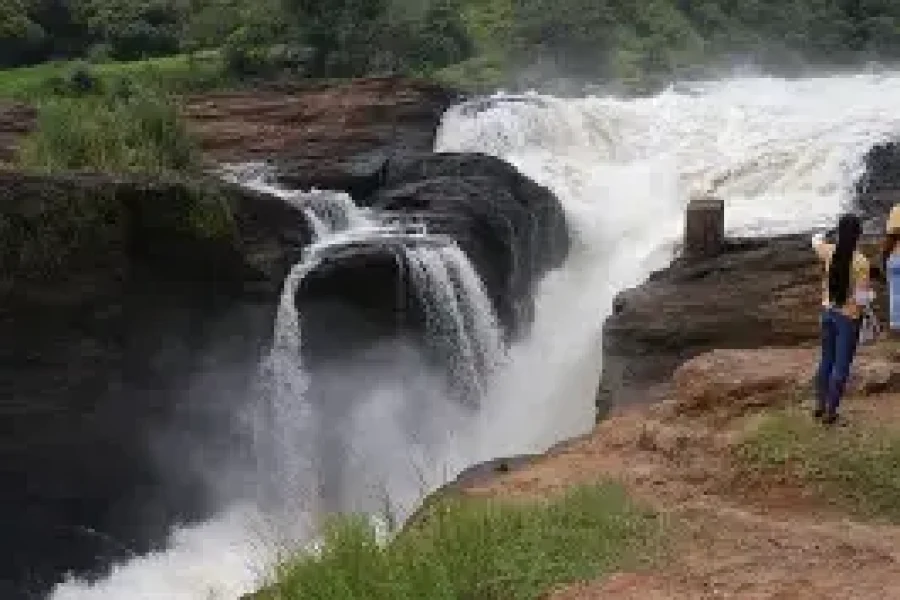
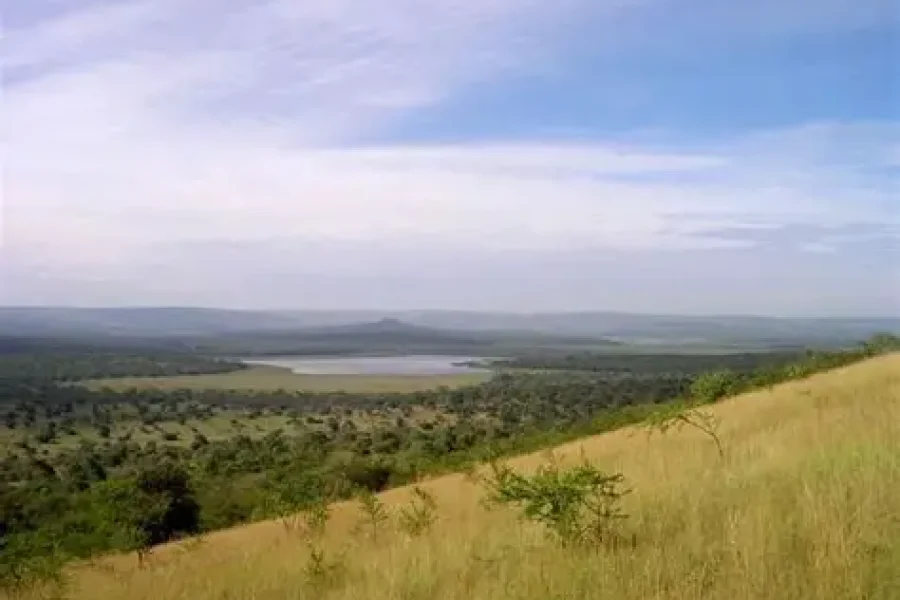
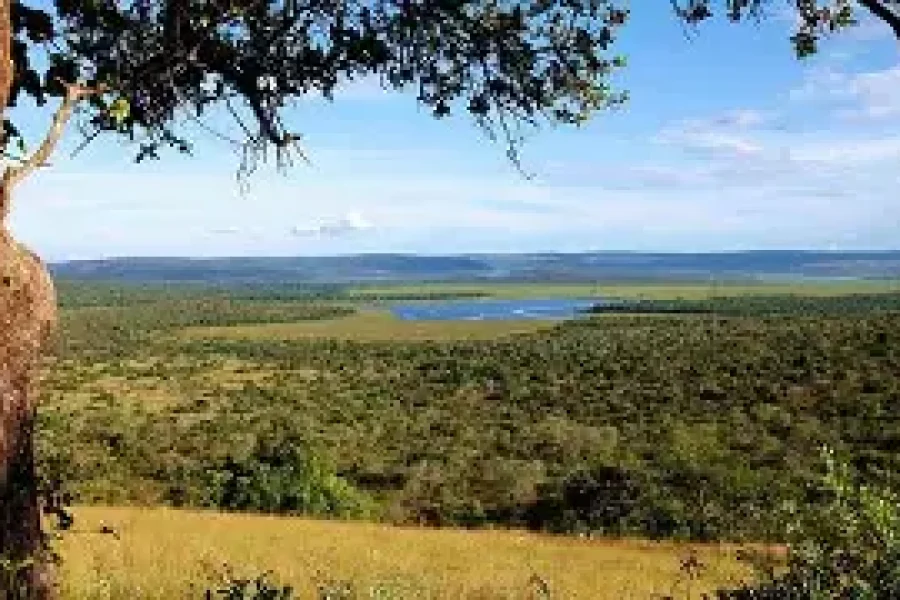
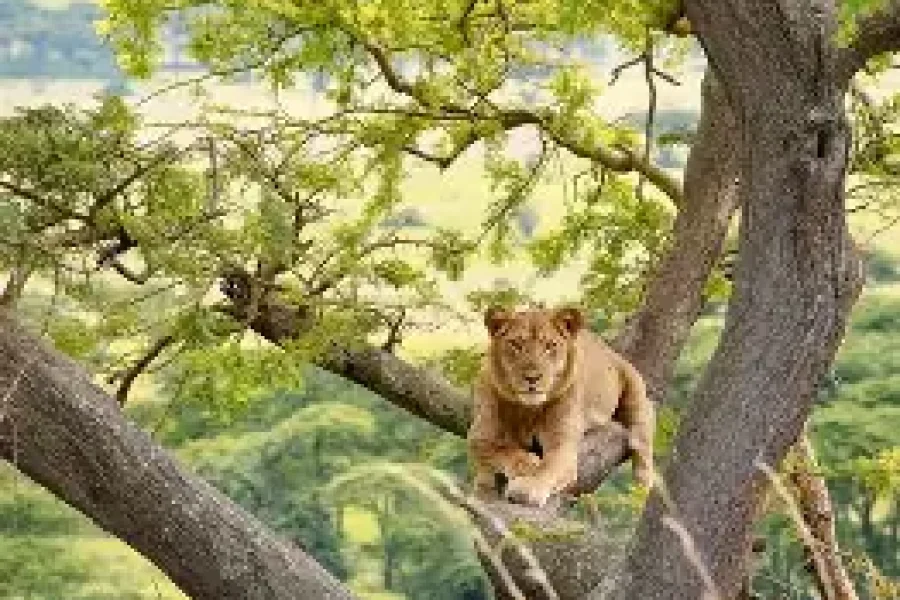
Leave a review